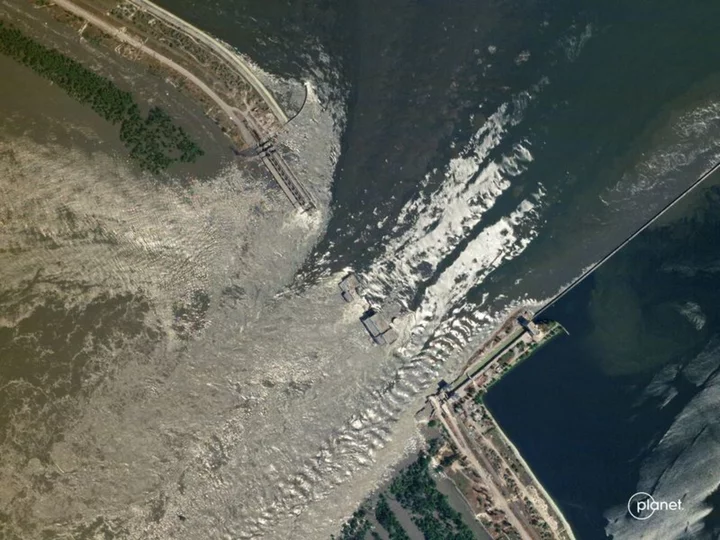By Guy Faulconbridge
MOSCOW (Reuters) -Mines uprooted and dispersed by floodwaters surging downstream from the breached Kakhovka dam across swathes of southern Ukraine could pose a grave danger to civilians for decades to come, the Red Cross said.
The vast Soviet-era Kakhovka dam, under Russian control, was breached in the early hours of Tuesday, unleashing floodwaters across a swathe of the warzone and endangering the lives and welfare of tens of thousands of people.
Ukraine blamed Russia for blowing it up. Russia said Ukraine sabotaged the dam at the behest of the West to constrict water supplies to Crimea and to distract from a faltering offensive. Some Russian-backed officials said the dam may have collapsed.
The waters have also washed over countless land mines sown during the 15-month war and nobody now knows where they are: they could still be in the minefields or could be stuck in the river mud or in fields, gardens and roads across a vast area.
"In the past we knew where the hazards were. Now we don't know. All we know is that they are somewhere downstream," said Erik Tollefsen, head of the Weapon Contamination Unit at the International Committee of the Red Cross.
"It is with a certain horror that we look at the news coming out," said Tollefsen in an audio clip, adding that World War Two mines found underwater in Denmark in 2015 were still active.
The war in Ukraine, the largest in Europe since World War Two, has left a vast amount of mines and unexploded ordnances across swathes of the country - a risk campaigners have been warning about since Russia sent in troops in February last year.
'MASSIVE' NUMBERS
Besides anti-personnel mines, both sides have used vast amounts of artillery shells and anti-tank mines. The exact number of mines in Ukraine is unclear, said Tollefsen.
"We just know the numbers are massive," said Tollefsen.
Tollefsen said the issue with mines was not necessarily the nominal number of mines but where they were laid - especially in a heavily agricultural country such as Ukraine.
He said that areas downstream of the dam contained minefields of anti-personnel and anti-vehicle mines laid by parties to the conflict.
Russian-installed authorities who control part of Ukraine's Kherson region warned residents on Thursday to be vigilant over the mines being washed downstream by the floodwaters.
"The flow of mines and other dangerous objects is possible," said the Russian-backed emergency control centre in Kherson region, one of five in Ukraine that Moscow claims to have annexed.
"As soon as the water subsides, we will immediately begin engineering exploration of the territories. But for now, be as careful as possible."
During a visit on Wednesday to the city of Kherson, which has been heavily impacted by the disaster, Ukraine's Deputy Prime Minister Oleksandr Kubrakov similarly warned of the dangers posed by floating mines and also of the spread of disease and hazardous chemicals in the floodwaters.
(Reporting by Guy FaulconbridgeEditing by Gareth Jones)

